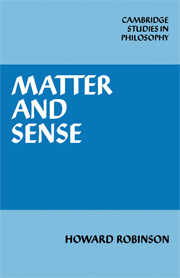Book contents
- Frontmatter
- Contents
- Acknowledgments
- 1 The materialist's problem and some non-reductive solutions
- 2 Supervenience and reduction
- 3 Behaviourism and stimulus materialism
- 4 The causal theory of mind
- 5 The disappearance theory
- 6 Reductive theories of perception
- 7 Matter: turning the tables
- Conclusion
- References
- Index
6 - Reductive theories of perception
Published online by Cambridge University Press: 07 May 2010
- Frontmatter
- Contents
- Acknowledgments
- 1 The materialist's problem and some non-reductive solutions
- 2 Supervenience and reduction
- 3 Behaviourism and stimulus materialism
- 4 The causal theory of mind
- 5 The disappearance theory
- 6 Reductive theories of perception
- 7 Matter: turning the tables
- Conclusion
- References
- Index
Summary
PERCEPTION, BELIEF AND BEHAVIOUR
We have whittled the materialist options down to one, namely behaviourism with a realist theory of dispositions. This theory is functionalism. It does not suffer from behaviourism's inability to state the necessary and sufficient conditions for being in a given mental state, for statements of the form ‘s is in mental state M if and only if there is some state internal to s which grounds (or realises) his disposition to M-behave’ do state at least a plausible extensional equivalence. But the behaviourist's inability to cope with subjectivity or consciousness remains unremedied. In that sense, functionalism is just as counterintuitive as behaviourism. In this chapter I hope to improve on intuition by presenting an argument to show that all behaviouristic theories of perception are false. The argument works against traditional functionalism and the causal theory, and is essentially independent of the arguments employed in previous chapters.
A behaviouristic approach to perception is sometimes explicity married to a belief theory of perception (e.g. in Armstrong, 1968, chs. 10 and 11 Pitcher, 1971). In this case, perception is subjected to a two fold reduction. First, perceiving an object is analysed as no more than acquiring, in some appropriately immediate way, the belief that the object is present. Second, the possession of that belief is explained as no more than the possessing of a capacity to behave in the appropriate discriminatory way with respect to that object. The integration of the belief theory into the behaviouristic approach is, from the viewpoint of the latter, not merely natural but necessary.
- Type
- Chapter
- Information
- Matter and SenseA Critique of Contemporary Materialism, pp. 95 - 107Publisher: Cambridge University PressPrint publication year: 1982



